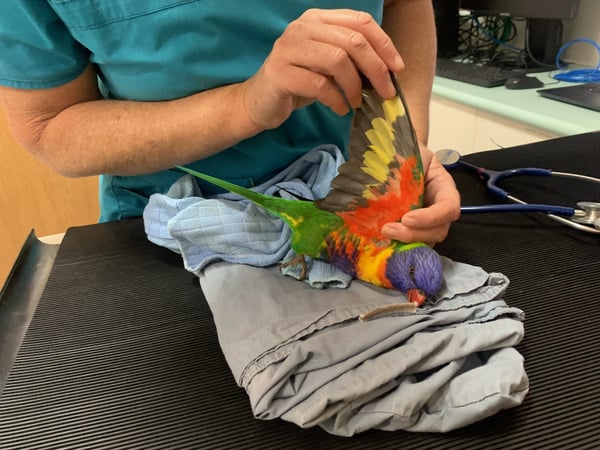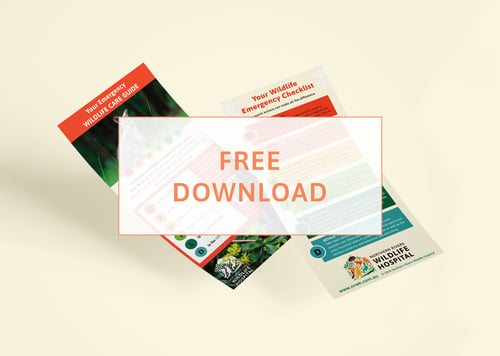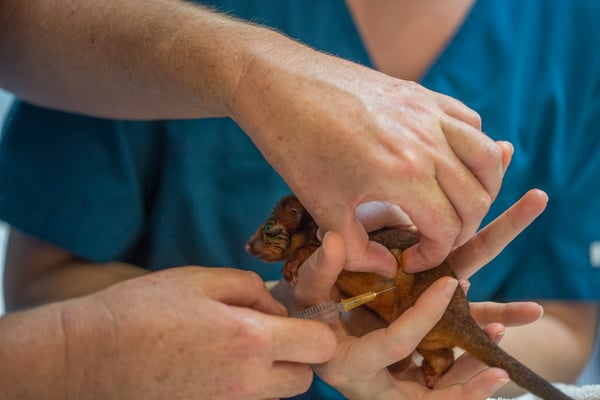Donate Now
Your gift will go directly to helping wildlife in need.
When the Northern Rivers Wildlife Hospital opens, it will be a first-class veterinary facility dedicated to the critical care, rehabilitation and conservation of wildlife. The hospital will provide surgeries and an ICU equipped with state-of-the-art technology, on grounds with rehabilitation facilities, gardens to support feeding the patients, and a large site for the erection of emergency facilities to treat and accommodate mass casualties during disasters. Stay up to date with the opening of the hospital by subscribing to the NRWH newsletter.

What to do if you find an injured, sick or orphaned animal.
The Northern Rivers Wildlife Hospital is currently under construction and cannot provide services until it opens. However, there are many wildlife services in the Northern Rivers who can help you if you have found a native animal that appears, injured, sick or orphaned - please click on the button below for a full list of organisations to contact in the region.

Animals can scratch or bite. Never approach or attempt to handle a distressed animal unless you have received training or directions from a professional wildlife carer and are certain you can do so without harm to yourself or the animal! If you need to handle an animal, wear gloves and eye protection. Please remember animals who are injured or sick may be aggressive to protect themselves. For help, please click the button below.
The Northern Rivers Wildlife Hospital is currently under construction with the grand opening scheduled for 2024.
If you would like to contact us please email info@nrwh.com.au
The NRWH wildlife transport van is fitted out with vital equipment to ensure the safety and wellbeing of patients while enroute. The NRWH wildlife van will become a vital tool in ensuring our patients receive medical treatment as quickly as possible and will transport animals between Brunswick Heads, Kyogle, Ballina and Lismore. If you are interested in volunteering to be one of NRWH wildlife van drivers please get in touch info@nrwh.com.au

The Northern Rivers Wildlife Hospital will provide short-term rehabilitation of sick and injured animals and will scale to accommodate long-term rehabilitation of certain species to reduce the workload of existing local carers in the region. The NRWH veterinary team will be led by a highly skilled wildlife veterinarian, who is capable of the highest quality clinical treatment, and also of student training, research and program implementation.

Our unique Australian wildlife requires specialised veterinary care. Local veterinarians may not have the skills, resources or time to provide excellent care for rescued wildlife.
Local wildlife carers also need to access specialised veterinary care for rescued wildlife. NRWH fills this gap in collaboration with our strategic partners and the northern rivers wildlife network (NRWN).

Evidence shows that early triage assessment and treatment by a specialist veterinary team results in better animal welfare outcomes and improved release rates.
Our hospital is located on a 2.5-hectare site at Wollongbar in NSW, specifically chosen to service the entire Northern Rivers region (over 20,000 square kilometres and 7 Local Government Areas). Our central location is accessible for the region's expected animal caseload and will help improve outcomes for wildlife and their continuing survival in the region.

The Northern Rivers Wildlife Hospital will play a significant role in community preparedness and resilience by:

The NRWH will have several purposes built, state of the art, rehabilitation facilities that allow patients in care to regain optimal health and fitness in preparation for their release. The NRWH recognised the gaps in locally available rehabilitation facilities for certain species and has built their facilities around this need. Our facilities include specialised flight aviaries to cater to small, medium and large passerines, freshwater bird aviaries with specialised ponds, freshwater turtle ponds and a climate controlled “dry dock” ward, a 30-meter circular raptor flight, a 15 meter smaller circular flight aviary, a macropod recovery barn and several multispecies aviaries.

The Northern Rivers Wildlife Hospital has a significant role to play in the conservation and protection of wildlife and their habitat across the Northern Rives and in New South Wales more broadly. The Northern Rivers is one of the most biodiverse regions in the world and our unique flora and fauna needs dedicated care and protection.
Our goals are to advance the natural environment by preserving and re-establishing the natural habitat of native animals; to advocate for the protection of wildlife and wildlife habitat; and to encourage other local charitable, cultural and environmental projects that are aligned with our vision.
NRWH’s impact will extend beyond the emergency care needs of individual animals to influencing and implementing systemic improvements in wildlife care delivery.
Further to this, NRWH seeks out opportunities to work with Universities, TAFE’s, and scientific groups on wildlife care, research, medical advancements and how wildlife interacts with agricultural pursuits.
As a centralised organisation dedicated to first class care and treatment of sick and injured wildlife NRWH plays a key role in advocacy and conservation of our natural environment.